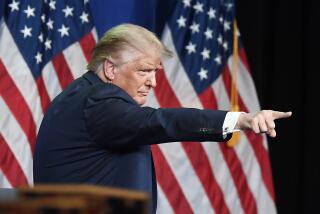Security Policy Tempers the Idealism
- Share via
WASHINGTON — The Bush administration’s new national security manifesto admits no error and expresses no regret, yet it reflects how an assertive American foreign policy has grown more conciliatory and pragmatic after colliding with messy realities in Iraq and other parts of the world.
The strategy document, issued by the White House this week to update a famously tough 2002 version, reaffirms a U.S. right to use preemptive force to eliminate a threat involving weapons of mass destruction. But it emphasizes that military action is a last option, and that diplomacy and collective efforts are the preferred ways to remove threats.
The 49-page document, echoing the idealism of President Bush’s second inaugural address, declares that promoting democracy is the surest way to build a better world. Yet, acknowledging that elections have given power to militants such as the Palestinian group Hamas, it concedes that voting alone is not enough, and that countries also need to build democratic institutions.
The new version shows an administration “more sensitive to the need to strengthen alliances, work with others, and develop agendas for cooperative action with other main centers of global power,” said Donald C.F. Daniel, who was recently an advisor to the White House National Intelligence Council and is a visiting professor at Georgetown University.
Some foreign policy specialists and former administration members were not surprised at the changes.
“In their second term, administrations tend to be more multilateral, more pragmatic,” said James Dobbins, a veteran diplomat who served as an envoy for the Bush administration. “It’s the pattern of every one, going back to Eisenhower.”
Congress mandated that such a report be issued each year, but the White House delayed an update for four years. Administration officials told congressional aides last year that the core of the policy was unchanged, so there was little reason for an update.
The new strategy staunchly defends the decision to invade Iraq three years ago. It acknowledges that U.S. intelligence on Saddam Hussein’s weapons of mass destruction was wrong but says “brutal regimes” would always try to hide their weapons programs. And it asserts that “the world is better off if tyrants know that they pursue WMD at their own peril.”
The document singles out Iran, warning that current international diplomacy to halt Iran’s nuclear enrichment program “must succeed if confrontation is to be avoided.” But administration officials said Thursday that talk of confrontation was not intended to signal plans to use military force against Iran.
The report says the United States does not rule out using force before attacks occur, “even if uncertainty remains as to the time and place of the enemy’s attack.” The role of preemption in the national strategy “remains the same,” it emphasizes.
Yet it also says, “Our strong preference and common practice is to address proliferation concerns through international diplomacy, in concert with key allies and regional partners.”
The document elaborates far more than the 2002 version on the need to strengthen alliances. It mentions American plans to broaden the responsibilities of NATO, to support what it calls United Nations reform, and to build international peacekeeping forces.
One Democratic Senate aide said he was shocked and heartened at the report’s “positively Clintonian” ideas, including international cooperation.
“They came into office saying they wanted an ‘ABC’ policy -- ‘anything but Clinton,’ ” said the aide, who could not be identified under the rules of his office. “But that seems to be over.”
The report distinguishes between “effective democracies,” of which the United States approves, and democracies that don’t share power or try to ensure that their populations benefit from democracy.
This language “recognizes the conundrum they face,” said Stephen Biddle, a defense policy specialist at the Council on Foreign Relations. “They believe democracy is the central route to success, yet they recognize that the way it works is more complicated than they appreciated a couple of years ago.”
Nikolas K. Gvosdev, editor of the foreign policy journal the National Interest, said the strategy document was a “bit of a hodgepodge.”
“If I’m an Iranian analyst trying to figure out the intentions of the Bush administration, the message I’m getting is awfully muddled,” said Gvosdev, who is also a senior fellow at the Nixon Center, a nonpartisan foreign policy think tank. “This raises a question of mixed signals.”
The 2002 security strategy, with its forceful calls for action, provided “a clear blueprint,” he said; “while this one has all these different elements, including democracy promotion and collective action.”
Dobbins said the administration might have blundered by emphasizing preemption and a possible confrontation with Iran while it is trying to build a coalition against Tehran.
“A certain amount of saber-rattling can help, but too much hurts,” said Dobbins, director of the International Security and Defense Policy Center at the Rand Corp., a nonpartisan think tank. “I think the appropriate lesson from Iraq would be that loudly proclaiming the possibility of unilateral action simply complicates the task of getting international support.”
More to Read
Sign up for Essential California
The most important California stories and recommendations in your inbox every morning.
You may occasionally receive promotional content from the Los Angeles Times.











